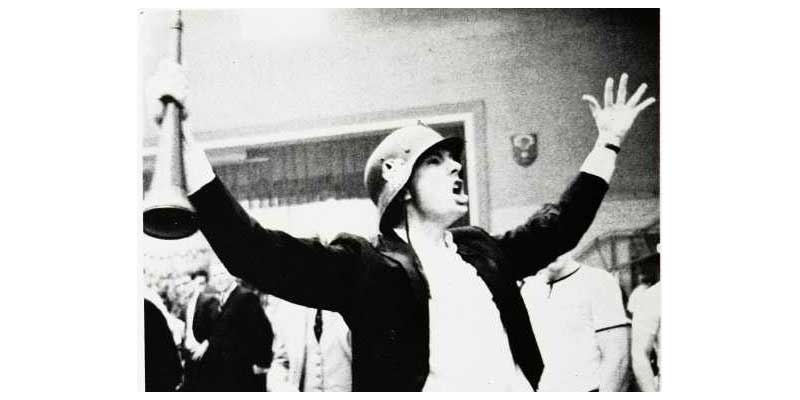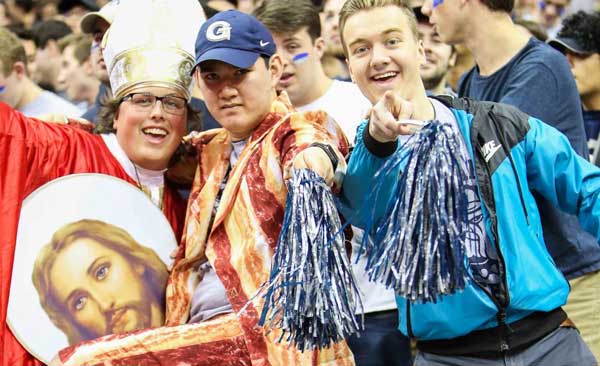Animal Farm

In 1984, during Mike Krzyzewski's earliest seasons at Duke University, its students were taken to task in the national press for pre-game antics in its Jan. 17 game versus Maryland.
The students at Cameron Indoor Stadium had developed quite the reputation for shouting four-letter words in games which the regional broadcasts tried to avoid. With new ideas of how to get attention on TV, they looked to the pre-game introductions. When the Terrapins introduced forward Herman Veal, who had been accused (but not charged) with a sexual assault on campus, students showered the court with womens panties and condoms. The incident led Duke president Terry Sanford, known casually to students as "Uncle Terry", to send a typewritten letter to the entire student body the next day, known in Duke lore as the "Avuncular Letter".
"It is generally assumed that a person resorting in conversation to profanity and obscenities is short of an adequate vocabulary. That is doubly true in public utterances," he wrote. "Resorting to the use of obscenities in cheers and chants at ball games indicates a lack of vocabulary, a lack of cleverness, a lack of ideas, a lack of class, and a lack of respect for other people. I hope you will discipline yourselves and your fellow students..."
The students responded accordingly and the sports media's love for what became known as the Cameron Crazies was reborn. Two decades earlier, Georgetown fans had its own uncomfortable moment with a student section.
In 1966, Georgetown had no Cameron Crazies, but they did have the Animal Section, a section of seats reserved at McDonough Gymnasium for upperclassmen that would cheer, boo, and generally be loud for 40 minutes, win or lose. As befitted an all-male College, dates were not allowed in the Animal Section. And while games versus American or Delaware would get a modicum of attention, games against the traditional contemporary rivals -- Maryland, George Washington, St. Joseph's, and NYU -- were peak season for the fans. Add in a regional TV game now and then, and McDonough could be the kind of gym to give opponents trouble.
On Feb. 5, 1966, Georgetown welcomed NYU for a Saturday night game. On the court, it was all Georgetown--Frank Hollendoner scored 26 first half points and finished with 28 points and 14 rebounds in a 104-73 rout. Fans could be heard chanting "NIT! NIT!" in an era when that wasn't a perjorative.
Off the court, a story from the sports information director at NYU found its way into the New York newspapers.
"John Geis, NYU sports publicist, said that during the first half of the game, two youths came out in front of the Georgetown student body," wrote the Jewish Press, based in Brooklyn. "The one dressed as a Nazi soldier held up his arm as a Nazi soldier and shouted Sieg Heil, the publicist said, adding that the Georgetown students replied Sieg Heil." This claim had received no reference in any of the Washington or New York-based newspaper accounts of the game.
But much like the game of "telephone", where more details get added at every call, the story took on a darker life of its own. The student was not dressed up as a soldier, for one thing. As described in The HOYA, the student was dressed in a white dress shirt, dress slacks, and a morning coat with tails. He wore a surplus helmet with the Georgetown bulldog logo on one side of the helmet and what appeared to be a Budweiser beer label taped onto the other.
The routine, if one could call it that, was picked up from a graduating senior of the Class of 1965, who also wore a army helmet and regaled the Animal Section with cheers in pidgin German. Parodies of Germans were not uncommon in the 1960's -- after all, Hogan's Heroes was a top 10 television show that year -- but the school simply did not expect the firestorm which followed.
"N.Y.U. SCORES POINT OVER NAZI ROOTER: Georgetown Team Will Leave 'Sieg Heiling' Student Fan at Home Tomorrow," read the New York Times on February 16, 1966. It gave reference to an official statement by Rev. Anthony Zeits, S.J., who said that "The impersonation of the German soldier and the Arab have been done frequently in the past by Georgetown University students at many other ball games. It is obvious that no slur was intended, and no offense was meant. Georgetown University has over 600 students who profess [a] Hebrew religion and many of its faculty are Jews. Many Jewish alumni and others have attended games in the past and we have never had a word of complaint before."
"It was a parody, a mockery of a Nazi soldier," Zeits told the Washington Post, "something you would find in a Grade-D late show on TV." Zeits' reference to a Nazi didn't help matters in the press.
"The incident was brought to light at a New York sportswriter's luncheon; since then the University has received inquiries from several New York papers," wrote The HOYA. "The first publication of the incident occurred in last Monday's evening papers. In addition, the Anti-Defamation League is looking with interest at the case; and it has been the subject of a program on NBC Radio."
Campus opinions were divided on what had quickly become an embarrassment to Georgetown.
In a letter to the editor, one sophomore noted that "The Arab and the German were part of the humorous parody routine of the Hilltop fans long before NYU came here to play this year. The student enthusiasm usually produces a variety of other amusing caricatures as well: a Batman, a student dressed in a Bulldog outfit, World War I aviators, paratroopers, flight mechanics, and campus "beauties" with long green wigs, all of which add to the color and excitement which mark the Georgetown games, both home and away. The...German has long shouted such "anti-Semitic" phrases as Rat Finks!, the Bulldog has parodied opponents' mascots for some time, and the other imaginatively outfitted students have similarly expressed their spirit."
A medical student student offered this response: "I am offended not as a Jew, but as a human being. The Nazis were not charged at Nuremberg with crimes against the Jewish people, but with "crimes against humanity," and everyone at Georgetown should be offended and ashamed, not because their Jewish friends were embarrassed, but because we are all human beings."
There was no disciplinary action taken. The students involved wrote that "We regret that suddenly the enthusiasm of Georgetown fans has been interpreted as anti-Semitic, but we would like to assure the members of the Georgetown community that not a hint of anti-Semitism precipitated our actions."
A week later, a meeting of representatives from the NYU and Georgetown student councils brought the issue to a conclusion. They stated that "in retrospect it seems clear that the incident can be most accurately described as innocent in origin, but which had possibly offensive implications. Clearly no malice was intended, nor was any question of anti-Semitism involved."
Georgetown's hopes for the NIT came crashing down in the midst of this story, though not strictly for bad press. At 13-5, the NIT seemed within its grasp until the Hoyas were blitzed at the Palestra by #8-ranked St. Joe's, 111-73. Two days later, a weary Hoya team was upset by Catholic University, 87-84. And if there were any concerns that the New York sportswriters might have to cast the vote not to invite Georgetown to the NIT in the wake of the NYU story, their task was made easier when the Hoyas lost to Manhattan at Madison Square Garden, 83-80. When the season concluded, it was Manhattan which was awarded the final NIT bid. Georgetown, at 16-8, stayed home.
Georgetown and NYU continued its basketball series without further incident through 1971, when NYU dropped all intercollegiate athletics. The Animal Section diminished in succeeding years, and faded out entirely by the early 1970's, not by administrative fiat, but interests of another kind--sitting without girls at basketball games wasn't as much fun. And the ability of fans to stir up passion along the sidelines disappeared entirely when students were consigned to seats beyond the baseline at Capital Centre and more recently, Capital One Arena.
A few years ago, an ill-informed social media post drew echoes of the incident from a half century earlier.

In a December 2017 Georgetown home game versus Syracuse, a Washington lobbyist accused a Georgetown student of anti-Semitism while watching the game on television.
"Look at the guy in the "bacon suit", wrote Hilary Rosen, a liberal writer and D.C. lobbyist, on her Twitter feed. "This is a Georgetown fan's anti-Semitic smear to the Syracuse team." She followed it up with a tweet reading "Hey bacon man, Syracuse for the win. Bigots lose."
The individual in question was junior Michael Bakan (pronounced "Bacon"), who wore the eponymous outfit at games. Once Bakan spoke up, it didn't take long for Rosen to be grilled mercilessly on social media, to which she retracted the tweet in response. Wrote one observer, "a journalist should do research to avoid falsely accusing someone of anti-semitism," while another simply told her "Never tweet again on behalf of [Syracuse]."
"I'm new to this school rivalry and got some bad info!" Rosen tweeted. A 1981 graduate of George Washington, she has lived in Washington for 40 years but was apparently unaware of Georgetown and Syracuse.
A month later, Rosen admitted to having bought 500,000 fake Twitter followers, calling it "an experiment". Her current followers total just over 100,000, and she has not returned to discussing Georgetown or Syracuse basketball since.
There is always a fine line between being fans and being fanatics. Duke fans argue about this often.
"Now, there are clearly lines that shouldn't be crossed," wrote the Duke Basketball Report in 2020. "The best cheers are aimed at teams, not individual players: there's a reason that the Not Our Rivals! chant against Maryland was so beloved...The Cameron Crazies continue to evolve with the times, just as our opinions on what is proper etiquette in the student section is. Remember, the Crazies once chanted "Sean May eats babies!" in a game against UNC...but didn't garner much attention in the moment."
"More than anything, we all need to remember that attending these games as a student is meant to be fun."
When better times return and students turn out en masse to Georgetown games, the words of Sanford also apply. "Think of something clever but clean, devastating but decent, mean but wholesome, witty and forceful but G-rated for television, and try it at the next game...it should not be up to me to enforce proper behavior that signifies the intelligence of [our] students," he wrote. "You should do it. Reprove those who make us all look bad."
"I hate for us to have the reputation of being stupid."